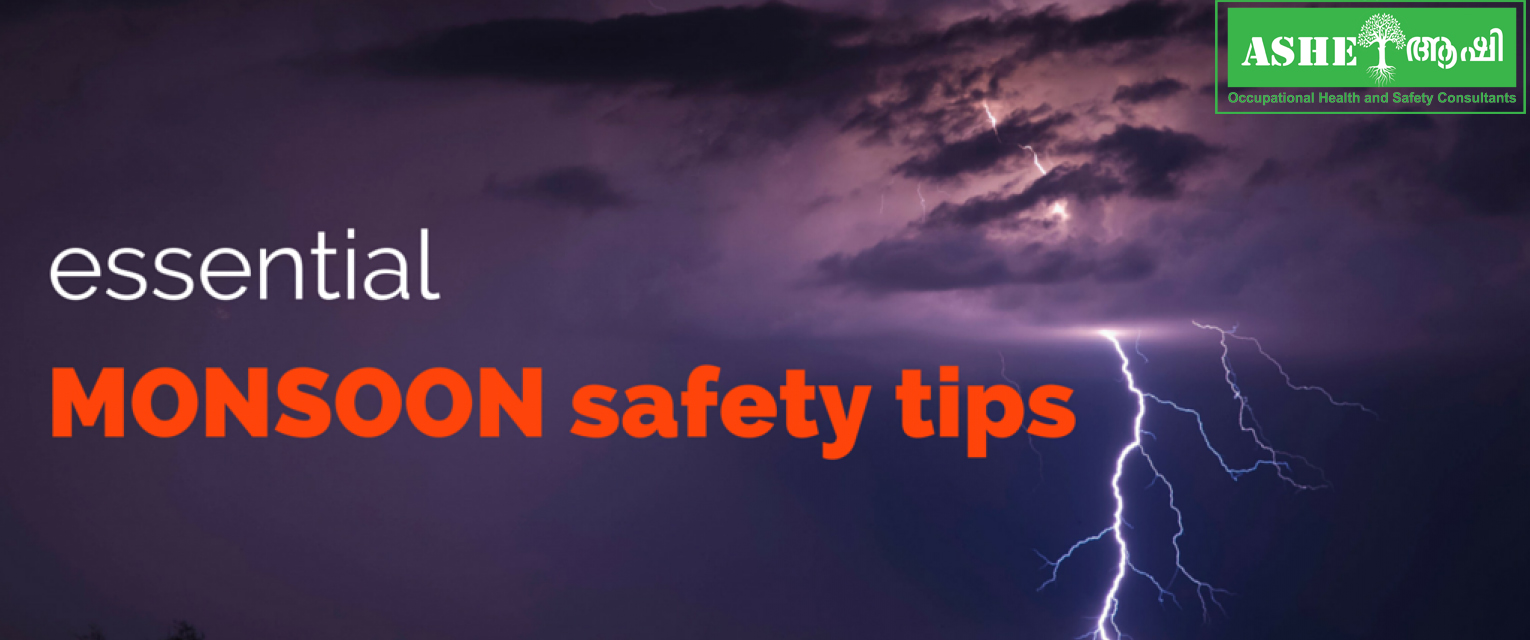The monsoon season is when people eagerly look towards the sky for cool, refreshing showers, which come as a relief after the scorching heat of summer. Although it rejuvenates every living organism, one should be careful about the dangers and diseased prevalent during this season. Some tips to stay safe in this monsoon season are:
Do not Touch Wires From Fallen Electricity Poles
Children are naturally inquisitive. When electric poles fall they like to go to inspect. In the process they touch electric lines which may be live. This has claimed lives of many children and adults.
Firstly children should be educated on the need to stay away from any electric wires from poles. Certainly they should stay away from water that accumulates around areas with electric poles. Besides fallen electric wires should be treated as live at all times.
People should not cut particularly wet tree branches that have fallen or come in contact with electric lines they may conduct electricity. It is prudent to call the relevant authority to come and attend to them.
Do Not Support Roofing Materials With Heavy Stones
Likewise it is not a good idea to tie your bicycle or motor cycle to an electricity pole as malfunctioning or falling wires could come in contact with your bike and electrocute you. Hence people should report any fallen electricity wires or any suspiciously dangling wires to the national power utility.
It is a common practice in rural areas to support roofing materials with heavy stones. This is supposedly meant to support the roofing material from being blown away by heavy winds during a storm. While this seems a brilliant idea, it can be very fatal at times.
If strong winds force the roofing materials off, the heavy stones could fall inside the house. This can maim people or lead to loss of lives. Therefore it is advisable to ask a competent person to attend to your roof so that it is firm and will not be destroyed during storms.
Stay Away From Lightning Prone Areas
No place is absolutely safe from lighting during a storm. Stay indoors during a storm that has lightning and thunders. Remember even a seemingly safe storm can bring unexpected bolts of lighting and loud roars of thunder. If you have to be outdoor make sure you are besides high rise buildings.
They shield you from lightning through their lightning conductors. If it takes less than 30 seconds between the time you see a lightning flash and hear a thunder that means you are within a 16 kilometer lightning range. Lightning strikes within that range. This is a good reason why you should be indoors during a storm.
If you are caught in the middle of a storm never seek shelter under an isolated trees or where you are the tallest object as this is a prime target for lightning bolts. If you are in an open space stay low crouch down and keep your feet together.
There should be no pools of water near you as these can conduct electricity from lighting during a storm. Don’t touch any metal objects. In the home desist from using a telephone with a line as this can conduct electricity. Switch of all electricity appliances including computers.
Precautions Against Mosquito’s
Mosquito’s breed more during the rainy season because they favour stagnant pools to lay their eggs and for the development of their larvae. Mosquito’s transmit malaria and this disease can be fatal to adults and children if not urgently attended to.
Any body temperature rises during this season should be treated with caution. Mosquito nets can be used during sleep. Complement the mosquito net with mosquito repellants, mosquito coils, insect’s sprays and repellent herbs.
Close all windows and doors before dark and wear trousers and long sleeved clothes if you have to be out after dark. Other precautionary measures includes fitting windows with mosquito screens, clearing gutters and draining any water accumulating garden tools and children’s toys.
First of all drain water from bird baths, unfiltered pools as this eliminates breeding grounds for mosquito’s. How ever for some reasons if there are excessive pools of water that you cannot deal with ask a professional health worker to apply a larvicide to reduce the mosquito population around your home.
Avoid Walking or Working In Rain
It is very tempting to drive through or walk through a pool of water. Walking or working in pools of water or when it is raining puts you to the risk of a host of viral diseases. Above all Most of them can cause a wide range of fungal infections.
For that reason people should avoid wet grounds. If you have to pass through pools of water for some circumstances beyond your control, make sure to bath with soap and dry yourself to kill all sorts of germs that can cause illness.
For instance, if you are a diabetic patient these conditions may put you at a serious risk. Other reasons for not getting yourself wet this season is the obvious reasons that you can get a cold, get worms in your feet, suffer from an asthmatic attack, get pneumonia among many other forms of sickness. You can keep extra clothes at work so that when you get yourself soaked you can change into warm clothes.
Use Of Electrical Gadgets During A Storm
Do not touch any electric wiring during a storm as this can potentially carry electricity from a bolt of lightning. For safety make sure you remove electrical gadgets before you hear the first rain drop otherwise after that it is too late and you could be exposing yourself to lightening. Stay away from sinks, tubs and toilet seats during a storm.
Plumbing material can conduct electricity from lighting strikes. This passage of electricity can also be used by electricity from lighting.
Avoid playing video games connected to the television during a storm. If you suspect that your home may be flooded during a storm pull down the main power switch. Afterwards when you have dried your home call a competent electrician to assess and ensure that it is safe to put up the main power switch again.
Attention To Weather Forecasts
Please follow weather forecasts during the rainy seasons as they inform your day to day decisions. These decisions may bring safety to you and your family. The decision may range from switching of all electricity appliances before going to work, carrying an umbrella, collecting the kids from school before a heavy storm and telling your kid to stay at school if the local river is flooded.
Desist from any activity that can put your life in danger. Weather forecasts can inform people in flood prone areas to move to higher ground. Take heed to these. Do not try to handle any situation that is beyond you during a storm.
In case of any emergencies, call for help and do not put your life or life of others in danger, Safety First. Always keep the contacts of the major emergency services like ambulances, police, fire brigade and the local civil protection unit.
Insure Your Property
If you can afford please insure your house, car, crops and any other valuable property from weather hazards like storms. This can keep your stress levels very low. Certainly losing a house, car or any form of property can be a very stressing experience that can slump you to a depression. Insuring your property can give you peace of mind and good health.
Giving insurance companies liability over your property can give u assurance. Remember to keep yourself safe because you are the most valuable thing your family can have. No amount of life cover can replace you.
Never Drive Through Flooded Rivers
Motor vehicles are quite buoyant in water and are easily washed away even by water that is barely half a meter high. Cars or Lorries spread their weight evenly on their wheels and that gives water a great surface area to dislodge them off the bridge. For this reason people should never cross any flooded river or a submerged bridge or road. Other safety tips for driving in wet weather include checking brakes, tyres and wipers before embarking on long journeys.
Most importantly Drivers should exercise extreme caution in wet condition. Moreover they should reduce speeds at all cost to avoid unnecessary accidents. Tarmac surfaces may be oily during the rainy season and this could make the road slippery. It is advisable to stop driving during a storm but if you have to drive for whatever reason don’t tailgate – that is following closely to the car in front. For example, if the car behind is tailgating you slow down and let it over take you for your safety.
During a storm turn your head lamps on (but don’t flash others) so that your car is clearly visible. Do not multi task when driving and ensure that your fan and air conditioner is working as it helps clear the mist off the windows. Also do not follow heavy vehicle closely behind as they splash your screen reducing your visibility. safety tips
You may have ignored these health and safety tips and got away with it but that may not be the case every time. The next time could be fatal. Please take the safety tips seriously. This may save your life and the lives of others. Please be safe this rainy season.


 WhatsApp us
WhatsApp us